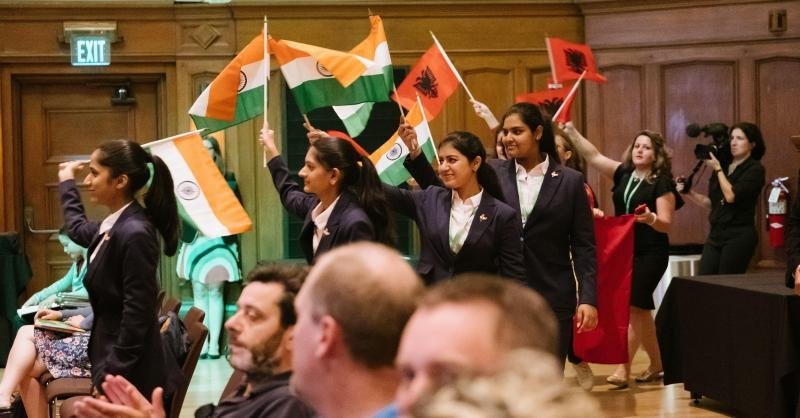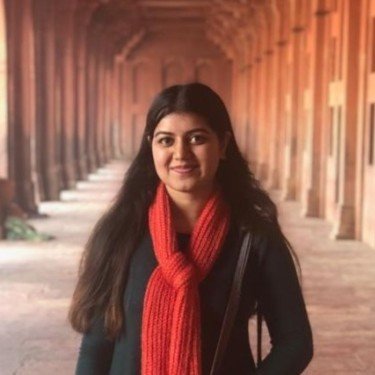Applying AI to Real-World Problems: Responsible Journalism
Ananya’s Journey to Computer Science
Growing up in New Delhi, Ananya was interested in plenty of subjects and activities but loved writing, dance and math the most. It wasn’t until she had an introductory computer science class in middle school that Ananya became interested in technology. The curriculum at her hometown high school was somewhat restricted, so Ananya had to resort to exploring CS outside of school, working with a tutor to prep for the AP exam and participating in a youth power initiative where students leveraged technology to solve real-world problems.
Ananya’s Introduction to AI
Ananya had not yet been exposed to AI when she heard about Inspirit, so was thrilled to learn she could participate in the AI Scholars summer program right in her home town. For Ananya, the most exciting aspect of the program was dwelling on ethical questions and learning about applications of AI from Inspirit instructors, graduate students from top universities who were working directly on these types of issues. She was also inspired by the cross-pollination of ideas from conversations with other students, learning what everyone was interested in and which projects her peers were working on.
AI + Journalism: Fake News Detection
Having always been passionate about writing and journalism, Ananya decided to work on a Fake News Detection project where students used natural language processing (NLP) to look at language computationally and find relationships between words. “We’re constantly hearing about increasing dissemination of misinformation and fake news, so it was fascinating to learn about this at a foundational level and try to solve the problem - how can we accurately predict whether a site is reliable or not?”
“The AI Scholars program was a unique launch pad for me as I entered my senior year of high school and college application process.”
After the program, Ananya participated with a classmate in an inter-school conference where they looked at AI ethics.
She was able to use her work on the fake news project as a starting point, researching principles of ethical AI to propose how to implement a fake news detection algorithm in real life, focusing on transparency and explainability for users. She loved this challenge of tackling important, real-world problems and continued to pursue new competitions and opportunities. As a senior, Ananya participated in a competition called Technovation focused on exposing girls to tech and entrepreneurship by applying technology to solve a community problem.
With her passion for responsible journalism, Ananya decided to found her own online magazine, Reflections.
The mission of Reflections is to provide high school students with an uncensored platform to express their views on interesting, relevant topics that they care about (E.g. Freedom, Evaluating Education, Music, Mental Health). As a simultaneously local and global platform, Reflections gives voice to the underprivileged students studying in Delhi as well as youngsters from countries like Malaysia, Egypt, Switzerland and USA.
Melange 2.0, described as “a riot of emotions, a mish-mash of vibrancy, and a celebration of creativity,” is the most recently published edition of Reflections Magazine.
Source: Reflections Magazine
Applying AI at Princeton and Beyond
TED Talk
Delivering a talk on fostering period positivity at the TED HQ in February, 2020.
“Being able to include this hands-on project experience from Inspirit and beyond was so important for my college applications, and it’s continued to prove valuable for applications to club positions and internships. I’ve also stayed in touch with my Inspirit Instructor, whose mentorship and letters of recommendation have been hugely helpful in setting me apart from other applicants.”
Now at Princeton, Ananya plans to major in Computer Science with minors in Cognitive Science, Technology and Society, and Creative Writing. She is the Associate Web Design and Development Editor at The Daily Princetonian, Events Team Lead at IgniteSTEM (a sub team of the Entrepreneurship Club) and a dancer in the Naacho South Asian Dance Company. Additionally, Ananya is a part of Princeton’s selective Service Focus program in the Public Interest Technology cohort, where she bridges the gap between her major in CS and her interest in service through discussions, field trips, and a hands-on client project. She works as a circulation desk assistant at the Architecture Library and as a software designer and developer for a reading app startup.
Ananya volunteers as an Advisor for NGO The Pad Project’s Global Ambassador Program for menstrual equity, co-leading the Public Health track. Named as one of India’s ten Youth Changemakers of 2019 by The Better India, she delivered a TED talk on fostering period positivity at the TED Headquarters, NYC in February, 2020 –– check it out at go.ted.com/ananyagrover –– which has been viewed by over two million people. She is also co-hosting an upcoming podcast called “The Period Health Pod” discussing menstrual and reproductive health issues!
The pad project works with women and girls across the globe to provide access to period equity – from products and services, to educational materials.
Source: The Pad Project
Ananya’s Advice to Younger Students
“Explore as many interests as possible, narrow down to a few things that drive you, and find a bridge between them. Even if you’re not going into computer science as a field, AI is going to be generally helpful with any endeavor. When you can combine domain knowledge and strong technical literacy, you’re better equipped to solve problems and be successful in any field. I would encourage you to explore as many interests as possible, narrow down to a few things that drive you, and find a bridge between them.”







